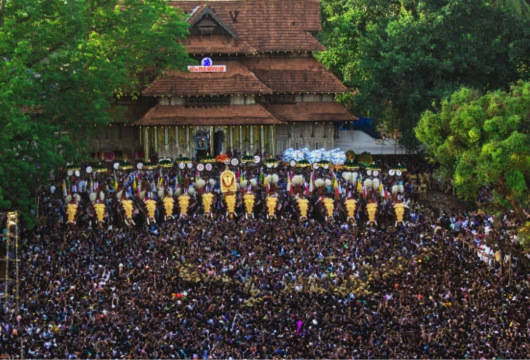Cochin Devaswom Board Advocates Eco-Friendly Waste Solutions for Thrissur Pooram
The Cochin Devaswom Board (CDB), responsible for several temples and events in Kerala, has announced a new call to action for waste disposal management during Thrissur Pooram, one of India’s most celebrated festivals. Beginning in 2025, the CDB is urging the Thiruvambady and Paramekkavu devaswoms, primary organizers of Thrissur Pooram, to adopt eco-friendly waste management strategies to handle the large volumes of waste generated during the festivities. Traditionally, the CDB-owned Pallithamam Ground has been used to sort and dispose of garbage. However, with the ground now unavailable, a shift towards sustainable alternatives is more urgent than ever.
A Legacy of Celebration Meets New Environmental Needs
Thrissur Pooram is renowned for its grandeur and cultural significance. Known for its elaborate elephant parades, vibrant fireworks, and intricate parasols, this annual celebration attracts thousands of visitors. However, with such high attendance comes the challenge of managing substantial waste—mainly food and organic refuse. Until now, Pallithamam Ground has been the primary waste sorting and disposal site. Still, the CDB’s recent decision to withdraw the ground for this purpose signals a need for new strategies.
Without Pallithamam Ground, the onus falls on local devaswoms to coordinate with the Thrissur Corporation and other municipal bodies to create an alternative waste management system. The challenge, though significant, offers an opportunity for the devaswoms to showcase leadership in sustainable practices, setting an example for other festivals across the country
Moving Towards Eco-Friendly Waste Solutions
One viable approach would be implementing zero-waste policies and eco-friendly waste management strategies similar to those used in other large festivals worldwide. By emphasizing waste reduction, reusability, and responsible disposal, the devaswoms can significantly lower Thrissur Pooram’s environmental footprint.
Some potential solutions include:
1. Composting and Organic Waste Management: Segregating and utilizing organic waste for compost production could be an effective solution. This method not only manages waste effectively but can also contribute to local agriculture.
2. Reusable and Biodegradable Materials: Encouraging vendors to use biodegradable plates, cups, and packaging can drastically reduce non-recyclable waste. Furthermore, initiatives that discourage single-use plastics will contribute to a cleaner environment.
3. Collaboration with Environmental Groups: Working with organizations like the Haritha Karma Sena, which has already been involved in Thrissur’s waste management, can help establish an efficient waste collection and segregation system tailored to festival needs.
A Call for Community Engagement
The new directive has come with its challenges. Festival attendees, local businesses, and vendors must adopt more eco-friendly practices. Public awareness campaigns, led by the devaswoms and the Thrissur Corporation, will be essential in guiding the community towards sustainable choices.
The move toward a sustainable Thrissur Pooram can also open avenues for community-based initiatives. Local schools and youth groups could participate in cleanup activities, and educational programs on waste reduction can be introduced. Such efforts can foster a culture of environmental stewardship, aligning with Kerala’s ongoing commitment to sustainable development.
Shared Responsibilities and Community Concerns
The shift in waste management strategy has stirred some debate. Poora Premi Sangham President Baiju Thazhakattu voiced concerns regarding the CDB’s decision, pointing out that other public events held at Thekkinkadu Maidan also generate significant waste. “Will the CDB apply the same measures to political events hosted at Thekkinkadu Maidan? Why is this issue being raised specifically for Thrissur Pooram?” Thazhakattu questioned.
Despite these concerns, many stakeholders see this as an opportunity to pioneer sustainable festival practices. With the cooperation of the Thrissur Corporation and active involvement from local waste management groups, Thrissur Pooram could set a benchmark in the eco-conscious festival organization.
The Role of Thrissur Corporation and Financial Support
In recent years, a portion of revenue from the Thrissur Pooram Exhibition has been allocated to support Thrissur Corporation’s waste management initiatives. Organizers have directed funds toward waste collection and disposal efforts during the festival days. However, the need for a more comprehensive approach is straightforward.
As they move forward, the devaswoms will likely need to assess and increase financial contributions to cover the cost of sustainable waste disposal. This could mean reallocating funds from the Pooram Exhibition or seeking sponsorships specifically earmarked for environmental management.
Inspiring a Greener Future for Festivals
The Cochin Devaswom Board’s appeal for sustainable waste solutions is more than just a policy change; it’s a call to transform one of India’s most cherished festivals into a model for environmental responsibility. With Thrissur Pooram’s vast reach and cultural significance, the festival can lead by example, encouraging other large-scale events in India to adopt similar eco-friendly practices.
In a world increasingly attuned to environmental conservation, adopting sustainable practices in festivals like Thrissur Pooram is timely and necessary. By investing in eco-friendly solutions, the devaswoms and the city of Thrissur can showcase a successful shift toward responsible celebration, demonstrating how traditions can evolve to embrace sustainability without sacrificing their essence.
For more in-depth analysis and inspiring climate news, click here.

